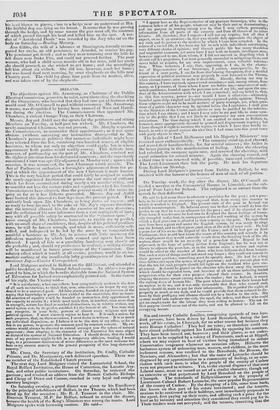On Tuesday week, the day after the dinner, Mr. O'Connell
at- Waled a meeting at the Commercial Rooms in Limerick, on the sub- ject of Poor Laws for Ireland. The subjoined is all extract from the speech he then delivered.
He said he had come there to advocate a provision for the poor ; not a poor. law, as he had on many occasions opposed that, front seeiug, the manner in which it worked in England. The present state of the poor in Ireland was ten ible to contemplate. Ile believed evely one in that room would do hint the ju-tiee to say that he was an advocate for the poor ; and if he objected to the Peor-laws, it was because he had seen in England the finest ,feelings of huma- nity trampled under foot, in consequence of the evil working of the system by ru Inch a legal provision is afforded in that country to the poor. Though there may have been a great evil under the English system, he was ready to adopt one for Ireland, and to effect great good even at the risk of some evil. Ile had a poor-law of his own—the Repeal of the Union ; and if he had got an hish Parliament, that would best kuow the wants of this country and remedy it by the employment that would naturally result from the bringing back of the ab- sentees, there would be no necessity of a peor-law then. Repeal he had adjourned, in the hope of geltil:g jastilla front England ; but he was not at liberty to adjourn the poor-law, as m the iuterim many a widow and orphan would be added to the number of those who have hitherto died from hunger. But such a state of things could not stand any longer; they could not remain at their present position ; something must be speedily done. Ile had for a long time deliberated upon the system of legal provision ; and his present plan was that the tax for such purpose should fall light on the resident who gave em- ployment. It should be placed on the absentee who drew away the resources which should be expended here, and heaviest of all on those unfeeling landed proprietors who for their own purpose cleared their estates. In America, dealing the estates meant cutting down the timber; but in Ireland, it meant the cutting down of human life. The poor when driven from their homes had no asylum. to fly to; and it was only reasonable that they who caused such, misery should be made to pay for their inhumanity. Ile regarded the rights of propel ty as much as any man, and he would provide that those reduced to dis- tress by their profligacy and idleness should not be a burden to the rich. His system would only embrace the sick, the aged, the infirm, and those who could get no employment for the labour they were willing to bestow. The tax for that purpose shoeld come out of the rents, and not be allowed to fall on the occupying tenant.


























 Previous page
Previous page